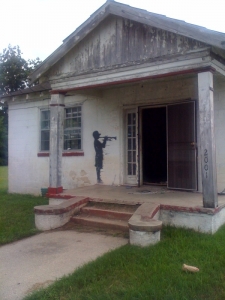 Sunday marked the 5-year anniversary of Hurricane Katrina. With this historic date, comes a flood (sorry, couldn't resist) of retrospectives, tributes and, of course, horrific tales. Two divergent stories are emerging - one of hope and one of frustration. New Orleans' bustling arts community not only endures, but has driven the city's slow recovery. Meanwhile, difficulties with rebuilding, bureaucracy and corruption persist.
Sunday marked the 5-year anniversary of Hurricane Katrina. With this historic date, comes a flood (sorry, couldn't resist) of retrospectives, tributes and, of course, horrific tales. Two divergent stories are emerging - one of hope and one of frustration. New Orleans' bustling arts community not only endures, but has driven the city's slow recovery. Meanwhile, difficulties with rebuilding, bureaucracy and corruption persist.
- Dear New Orleans, a 31-track benefit album created to raise funds for Gulf Coast-related charities, quickly rose to the #1 spot on Amazon's MP3 charts. It features tracks by My Morning Jacket, Bonerama, Steve Earle and OK Go. The title comes from "Dear America," a touching open letter published in the Times-Picayune newspaper shortly after the levees broke. If you order the album directly it comes with three bonus tracks.
- Much of the five-year anniversary media coverage involved musicians reflecting on the storm. Many feel that music will continue to be the saving grace of the region. In one article, Dr. John, Irma Thomas and other influential musicians say music truly saved New Orleans in Katrina's aftermath. Hot 8 Brass Band tuba player, Benny Pete, notes how music "showed us the value and power of our culture." In this article in Offbeat, Louisiana's music and cultural magazine, local musicians talk about where they were before the storm and where they are now.
- The entertainment industry is abuzz about the anniversary and celebs are continuing their effort to save the Gulf and raise awareness of the help that is still needed. Spike Lee returned to the Gulf to screen his newest project documenting the story of communities still in shambles. The new joint airing on HBO, "If God Willing and Da Creek Don't Rise," covers both the lack of action to restore the Gulf and the recent BP oil disaster. The Hip Hop Caucus organized a march and rally to commemorate those who died in the storm and call for a comprehensive recovery plan.
- Not doing anything tonight? Catch the one night showing of The Big Uneasy, a film by comedian, activist and New Orleans resident Harry Shearer documenting the government's failed response to Katrina. Check the listings to find a showing near you.
- Behind this all, are some very real challenges andborderline atrocities facing the ongoing recovery efforts. The Small Business Administration, the same federal agency charged with helping businesses recover from the oil spill, has been engaging in discriminatory lending practices according to an Associated Press investigation. The report revealed that 55% of all loan applicants were denied while cushy country and yacht clubs were loaned millions to re-build (often bigger and better than before). Businesses in low income areas were denied without even having their materials reviewed. Racial disparity was commonplace, with white communities receiving more approvals than black neighborhoods with the same median income, according to the story. An SBA whistleblower leaked that "if you were of a certain income, we funded you first."
- Meanwhile, a state agency created to help families rebuild their homes is sitting on almost $800 million in funds, while New Orleans residents say they can't get anyone on the phone to follow up on their claims - some of which date back a year. The funds have sat around for so long that they've outlived the state agency that initially ran the program. On top of that, a Federal Judge ruled last week that the agency was also using racially discriminatory practices.
- New Orleans Musicians Clinic, a healthcare clinic that treats musicians and artists of the city, is one of 25 nonprofit health clinics and organizations whose federal funds are on the chopping block. Check out this story of a paralyzed musician who lost all his possessions in Katrina, but credits the clinic with helping him stay an active member of the arts community.
It can be disheartening to read about New Orleans and the Gulf, but the good news is that you really can make a difference. Whether you order the Dear New Orleans album, write a letter to Congress or sign this petition, everyone can be a part of the region's recovery.